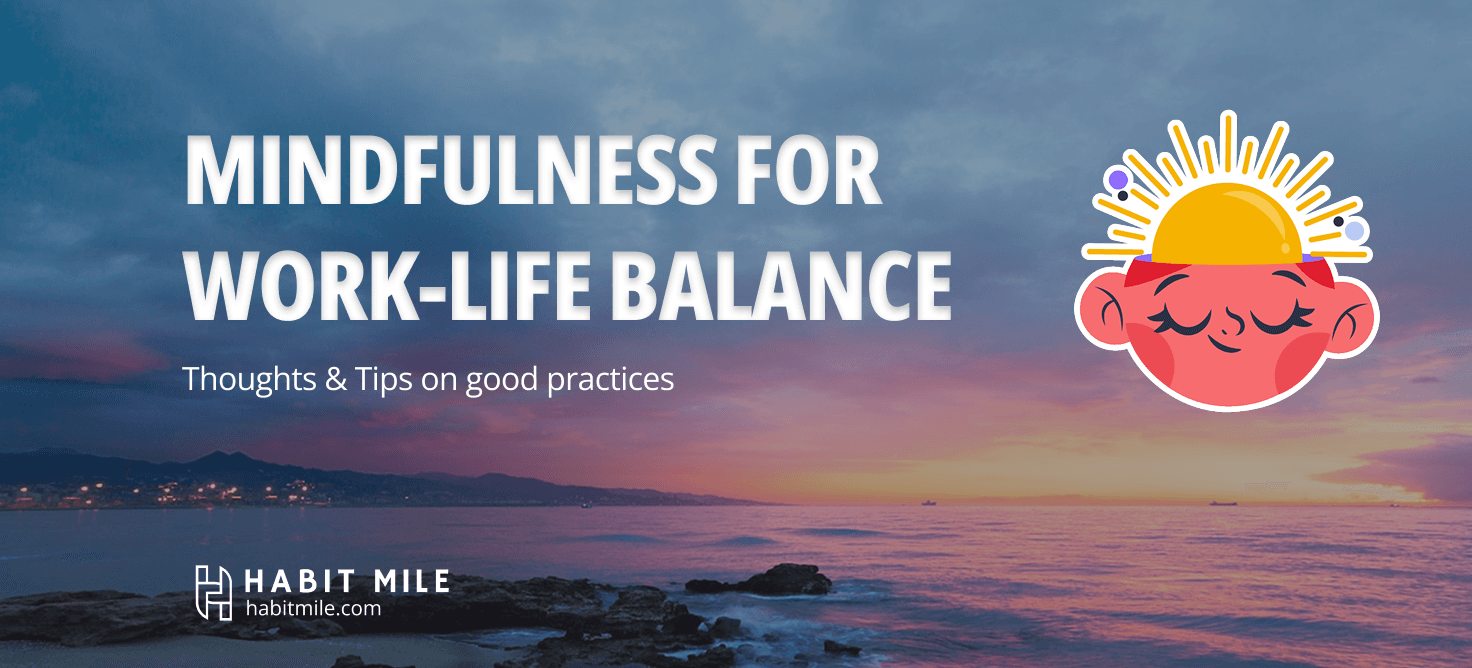Mindfulness for work-life balance

2024-09-16

In our crazy at times busy lives, balancing work and personal life can be challenging in today’s busy world. But mindfulness can be a helpful tool for managing stress, improving productivity and creating a better work-life balance. By staying focused on the present moment, mindfulness helps reduce distractions, improve decision-making and handle stress more calmly.
Let’s see at how mindfulness can help you form good habits, manage time effectively and reduce stress in both your personal and work life.
The science behind mindfulness
Mindfulness isn’t just about relaxation; it has deep roots in ancient Buddhist practices and is backed by science. Research shows that mindfulness activates the prefrontal cortex, the part of the brain responsible for decision-making, self-control and problem-solving. This leads to better focus, less stress, and improved emotional control.
A study from Harvard Health found that regular mindfulness practice can reduce stress by up to 38%. Practicing mindfulness helps train your brain to stay calm and focused, which is especially helpful in today’s fast-paced work culture.
How mindfulness supports this?
Mindfulness helps you recognize when you're feeling overwhelmed and gives you tools to stay balanced. It helps you stay aware of how you're spending your time, which makes it easier to focus on what’s most important and build a healthy balance between work and home life.
Mindfulness techniques in everyday life
Here are some simple mindfulness techniques you can use every day to reduce stress and stay focused:
1. Mindful walking
Either you’re on a break at work or walking outside, practice mindful walking by paying attention to your senses. Focus on how your feet feel on the ground, the sound of your footsteps and the sights and sounds around you of maybe birds chirping or gush of air sound made by leaves. This can help you relax and stay present.
Tip: Take a 5-minute mindful walk during your lunch break or between tasks to clear your mind and refresh yourself.
2. Mindful Eating
Instead of rushing through meals while working or watching TV, try mindful eating. Focus on each bite like its taste, texture and smell. Try to eat by hands so you can feel it more better. This can help you enjoy your food more, eat healthier and take a mental break from your day.
Tip: The next time you eat, do it without distractions. This can help you feel more connected to your body and give you a break from stress.
3. Mindful Listening
At work or home, it’s easy to get distracted when someone is talking to you. Practice mindful listening by giving your full attention to the speaker. Make eye contact, don’t interrupt and avoid distractions like checking your phone. This can improve communication and also relationships.
Tip: In your next conversation, focus entirely on what the other person is saying without thinking about your response. This helps you stay engaged and present.
Overcoming Challenges in Mindfulness Practice
While mindfulness is helpful, it can sometimes be difficult to stick with it. Here are common issues we all face and there are tips on how to overcome them:
1. Mind Wandering
It’s normal for your mind to wander during mindfulness practice (full time day-dreamer, huh?). When this happens slowly bring your attention back to the present moment. With time, it will become easier to stay focused.
Tip: Don’t get frustrated when your mind wanders. Just notice it, let the thoughts pass, and return to what you're doing.
2. Lack of Motivation
Starting a new mindfulness routine can be tough and also boring at times, especially when you're busy with work and family. Begin with short sessions, like 5-10 minutes a day and gradually increase the time as you get more comfortable.
Tip: Link your mindfulness practice to something you already do, like taking a few mindful breaths before starting your day or before going to bed.
3. Perfectionism
Mindfulness isn’t about being perfect. It’s about accepting your thoughts and feelings without judgment of yourself. Don’t worry if your practice doesn’t go perfectly the rule is to keep practicing.
Tip: Approach mindfulness with an open mind. There’s no need to be perfect just practicing is enough.
Productivity tips
Mindfulness can help you build better habits and reach your goals. By staying present and focused, you’re more likely to stick to good habits that lead to long-term success.
Mindfulness can also help improve your productivity by allowing you to take breaks and reset during the day. For example, using mindfulness breaks can help you recharge mentally and stay focused, which is especially useful when you're balancing work and home life.
Tip: Combine mindfulness with time management techniques like the Pomodoro Technique. Work for 25 minutes, then take a 5-minute mindful break like stretching or taking deep breaths. This prevents burnout and keeps your mood and energy up.
Few more tips
1. Find a mindfulness practice that works for YOU
There are many ways to practice mindfulness from meditation and yoga to simply taking mindful walks or journaling. Try different techniques to see what feels most comfortable and easy to stick with.
2. Be patient
Mindfulness takes time to learn. Don’t get discouraged if it feels difficult at first. With regular practice, you’ll start to see the benefits like lower stress and better focus.
3. Make mindfulness a part of your routine
Schedule mindfulness into your day just like you would schedule meetings or tasks. Whether it’s 10 minutes in the morning or during lunch, making time for mindfulness is important for reducing stress and staying balanced.
4. Create a good environment
Surround yourself with people who support your mindfulness journey. Whether it's family, friends or colleagues, having a supportive group can help you stay motivated and committed.
Conclusion
Mindfulness is a simple yet great way to reduce stress, improve focus and build better habits. By practicing mindfulness techniques like mindful walking, eating and listening, you can stay present and work towards creating a balanced life that helps you grow personally and professionally.
Remember, mindfulness is a process. The most important thing is to start and keep practicing. With time you’ll find yourself better able to manage stress, stay organized and enjoy a healthy work-life balance.